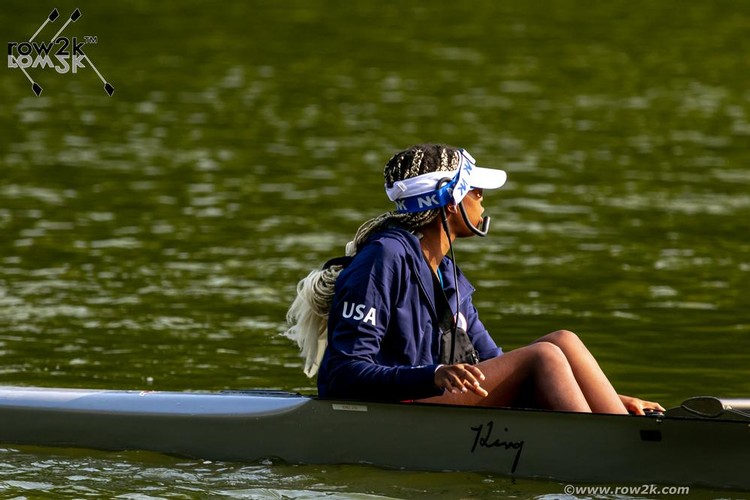In the Driver's Seat, with Ryan Brown

Next up In The Driver's Seat—-where we hear from the folks who add that extra something to the teamwork of a crew—-is coxswain Ryan Brown.
Ryan coxes with Dallas United Crew--where you can find her and her fellow drivers on Instagram at @duccoxes--and she spent last summer training and racing with the USRowing Selection Development Camp. She started coxing the summer before her sophomore year at DUC, and is now a senior at The Hockaday School in Dallas.
Let's hop In The Driver's Seat with Ryan:
row2k - What do you see as the three most important things for being a successful coxswain?
Ryan Brown - Number 1, always be a team leader, especially off the water. While being in charge on the water is important, I have found more success leading my team on land. Whether I am taking team attendance or running a core circuit, I try to take charge of as many things as I can. Not only does this help the coach run a smoother practice, but I have found that it also gets my rowers used to listening to my commands on land, helping them listen better on the water.
As coxswains, I feel that a lot of our job on land is overlooked, so I definitely try and prove that I can not only lead a crew on the water, but also get them doing what they need to do on land to keep having success on the water.
Number 2, always listen to your coach and teammates. I think that I learned the most about coxing this spring season on the launch. Listening to my coach work with the boat while I was not actively running a practice helped because I was able to ask him questions about how he wanted things to run in the moment. Then when I got my answer, I made sure that he knew I was listening and I executed what he wanted the next time I was in the boat.
You have to listen to more than just your coach, too. Listening to the rowers is another big part of my job. Every other day after practice, I like to go up to one or two of my guys, usually a different one, and ask them how they thought the practice went. If practice went well, I ask them what I did that made it run smoothly. If it went badly, I ask them what I could have done better that day. Asking questions, listening, and following through with the feedback is super important to being a successful coxswain. Coxswains are there to help the coach run a good practice and the rowers go faster, so checking in with them often is a great way to be successful.

Number 3, never stop learning. The minute that you stop trying to improving, someone else will take your spot. I have seen this happen many times, which is why I always try to keep learning. Listening and asking questions helps with this, as it shows your team that you want to be better, but I also like to keep notes on every practice. I set personal goals for myself every 6 weeks, and throughout that time, I check in with myself every week on how it's going. The goals aren't things like, "win Head of the Charles," but about my improvement as a coxswain.
Besides setting goals, I also listen to recordings, both of myself and other coxswains. I will write down positives and negatives for each recording and implement the things I like into my coxing. We did this at Selection Development Camp, and it really helped me to see what calls I could add to my coxing.
row2k - What is your favorite drill to run with your crews? Any tips on how to the drill well, for maximum effectiveness?
Ryan Brown - My favorite drill to run with my crew is pause at the finish. It's good for the crew to find a common collection point in the stroke, especially when the boat is unset. Pausing at the finish forces the rowers to set the boat at the beginning of the recovery. For my crew, when the boat is unset, the entire row is bad, no matter the splits, so I like this drill because it helps me feel and see who is off. When they go to the pause, I look out to see who is early or late, and watch them when we get back to continuous strokes.
I like to run the drill by 6s first, starting with stern 6 and moving through all 4 sets of 6s. At my club, we run a lot of '10 pause, 10 continuous' sequences, so I have them do that with each set of six, so each six can apply the drill right after using it. After that I will run 10 pauses, 10 continuous with all 8 until it feels set on all 10 continuous strokes.
For calling the drill, I don't count on the pausing or continuous; I prefer to stay quiet during the pauses. I try to limit myself to short phrases during this drilling so it is easier for the crew to process, only talking when someone is off or to call them out of the pause, so they can really listen to the boat and hear their finishes together. During the continuous strokes, I will count the last three before having them pause again. While they row continuously, I like to remind them that they are still collecting at the finish even when we are not pausing.
row2k - What's some of the best coaching advice you've received about your coxing?
Ryan Brown - The best advice that I have ever gotten from a coach was to cox like I am reading a children's book. When my coach, AJ Brooks, first said this I was super confused, but when he explained the concept to me, it made perfect sense. If you are reading a book to children and screaming every word at them, it would be super hard to understand, and they probably won't be able to listen to you. If you speak calmly and normally, however, then they will actually be able to process what you are saying.

This translates well to coxing: in the boat, most rowers are not always 100% tuned in to what you are saying, and if you are constantly screaming commands at them, it will take more energy to try and decipher what you are saying and they will most likely ignore you. This advice helped me because I used to yell in the boat a lot, and my rowers were always saying how they couldn't understand me, but when I switched to talking, the calls I was making became effective, and my rowers were more actively listening.
row2k - What is a mid-race call or move that you've made that you'll remember for the rest of your life? If so, what did it involve and how did you call it?
Ryan Brown - A mid-race call that I will never forget happened in the last 100 meters of my 2V8 race at the Heart of Texas Regatta. Before the race, my stroke seat, who had never stroked before, asked me to call a "pop" in the last 100 to get us through the line. We had never practiced this before the race. I remember being so nervous that I was willing to do anything the guys wanted to make this race good, especially since it was my first race not in the 3v all season.
During the final stretch of the race, we were even with Texas Rowing Center, so I called the "pop" in the last 100m, but since I had never done it, I called it out of nowhere and it was super frantic. The guys did not know how to respond to it. We ended up going through the line right as Texas did. We all thought that we had lost the race, and on the row back up, I was super out of it, beating myself up over ruining our first race of the spring season. When we got on the dock, everyone was moving super slow, still upset that we lost, until our coach came over and congratulated us for getting first place by 0.3 seconds.
Even though we won, I think about this race a lot, because it reminds me that I need to have more trust in myself. In the coxswain seat, I often find myself hearing 8 other different opinions on how to go about running a practice or call a sprint. While I often want to do whatever my rowers are saying, I need to remember that I am sitting in my seat for a reason, and that my coach trusts my reasoning. This entire experience helped me become more confident in my own opinion and to trust that I am doing what is right in race or practice situations. This is not to say that I never listen to my rowers, but at the end of the day, I need to stay in control of the boat and use my knowledge to decide what is best.
row2k - Can you tell us what you've learned about how to call the sprint?
Ryan Brown - One thing that I've learned about calling the sprint is that I need to be calmer and very specific in my word choice. I got a lot of positive feedback on my sprint calls over the 2023 spring season, and a lot of my guys think that it is the strongest part of my coxing, because it was aggressive and energizing. Then, in the middle of seat racing for nationals, I got some feedback that I was a bit too excited and it was making the sprint wild and unpredictable. After hearing this, I approached the sprint a different way.

Now when I call sprints, I first let the rowers know when we have hit our sprint marker, usually around 500-300 meters to go, and I use my tone to get the drive more aggressive, but keep my voice controlled so that the ratio of the boat does not go down to 1:1. I have also stopped calling a lot of rate shifts, and look for more in the drive. Since a lot of my crews base at pretty high rates, going higher often will not make them faster, so I look for power in different parts of the stroke.
I will often call three 10s in the sprint to build speed: one for a quick drive, one for direct catches, one for strong finishes. This often takes us through the line and also cleans up the rowing for our final strokes of the race. This is helpful for my team, as we are not physically the biggest or strongest team, so we have to make up for power in the technical parts of the stroke. When we row better, we have a higher chance of hanging with faster crews, which is why I spend so much time emphasizing it in the sprint.
row2k - Tell us about the best race/practice you've ever had?
Ryan Brown - My best and favorite race ever happened this spring at the Husky Open. I was in the Men's V4+ and it was my boat's second race of the day. They had just raced in the 1V8 and did not make the top 3, so they were determined to make it in the 4+ to go home with hardware.
The beginning of the race went well: we had secured the lead and the guys were super pumped. It wasn't until about the last 500 meters that we started to get tired, from racing for the second time that day, and Pocock's four started to walk up on us. I was racing with the top 4 guys on our team and I knew that in that moment I needed to lead us to get the first place medal that we deserved.
I remember making a specific call to them, saying "Boys, you didn't get first in the 8, you need to take first now," and we walked it back on Pocock, going through the line first. After finishing the race, we had to wait in the bay for the rest of the races to finish, and I remember being super happy that we got to go home with a first place medal.
Thanks for riding along with Ryan -- and, remember, this column is open to all "drivers" out there, so if you are an experienced coxswain at any level--from juniors to masters--and would be willing to invite row2k to join you in your ride, just contact us here. We’d love to hear from you about what you see from the Driver's Seat.
If you enjoy and rely on row2k, we need your help to be able to keep doing all this. Though row2k sometimes looks like a big, outside-funded operation, it mainly runs on enthusiasm and grit. Help us keep it coming, thank you! Learn more.
Comments | Log in to comment |
There are no Comments yet
| |
- Bont Rowing
- Calm Waters Rowing
- Concept 2
- Craftsbury Sculling
- The Crew Classic
- CrewLAB
- Croker
- Dad Vail Regatta
- Durham Boat Co.
- Empacher
- Faster Masters
- Filippi
- Fluidesign
- h2row.net
- HUDSON
- myrow
- Nielsen-Kellerman
- Oak Ridge RA
- Peinert Boat Works
- Pocock Racing Shells
- Race1 USA
- Rockland Rowing Masters Regatta
- RowKraft
- Rubini Jewelers
- Vespoli USA
- WinTech Racing
- Bont Rowing
- Calm Waters Rowing
- Concept 2
- Craftsbury Sculling
- The Crew Classic
- CrewLAB
- Croker
- Dad Vail Regatta
- Durham Boat Co.
- Empacher
- Faster Masters
- Filippi
- Fluidesign
- h2row.net
- HUDSON
- myrow
- Nielsen-Kellerman
- Oak Ridge RA
- Peinert Boat Works
- Pocock Racing Shells
- Race1 USA
- Rockland Rowing Masters Regatta
- RowKraft
- Rubini Jewelers
- Vespoli USA
- WinTech Racing
















